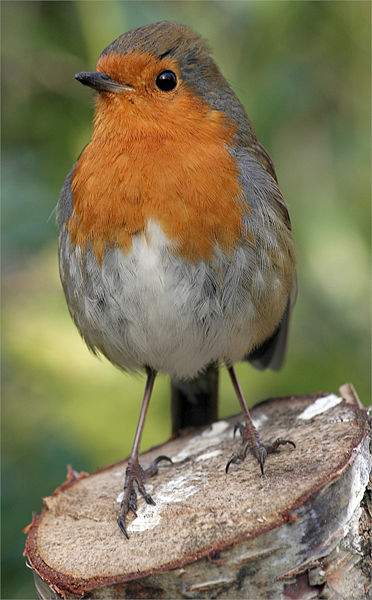 |
| British subspecies of robin (Erithacus rubecula melophilus) |
In Britain we are used to the robin, Erithacus rubecula (not to be confused with the American robin, Turdus migratorius, to which it is only distantly related) in our gardens feeding from bird tables or playing close attention to our gardening activities and darting in to pick up the occasional worm we might dig up. They can even be quite easily tamed, especially with mealworms, and will take them from your fingers.
Such is its familiarity to us, and such is the affection in which we traditionally hold it, that its name derives from the early English habit of giving familiar wild animals human names, such as Jenny Wren, Tom Tit, Brock Badger, Reynard Fox and Robin Redbreast. In fact, it was previously called the redbreast but the humanised name stuck.
In the rest of Europe, especially the forested parts, the robin is a rather shy bird of the woodlands, so why this difference?
Well, where the robin is a woodland bird, the wild boar is still reasonably common. To understand why, we need to understand how the wild boar feeds - by using its snout to turn over the top few inches of soil looking for anything edible - roots, grubs, worms, etc. Robins will perch close by and dart in to grab anything the boars roots up and miss. Whether or not the boars benefit from this association is unknown and probably no concern of the robin. It could be that the robin's alarm call warns of predators - not that the adult boars have many in Europe but bears, lynxes and wolves will take the young if they get a chance.
 |
| Wild boar, rooting |
In short, the robin sees humans as pigs because to a robin our 'rooting' activities in the soil yield the same harvest.
This illustrates nicely how, from the perspective of genes, what looks like a major environmental change to some sets of genes - those of humans and wild boars - to those of the robin so far as its feeding behaviour is concerned, the change was barely noticeable and only needed a slight tweak to continue much as before, forming an alliance with a new set of genes in place of a very similar old set.
It is humbling to think that our companionable little garden robin is seeing us, for all practical purposes, as pigs. Tweet


No comments :
Post a Comment
Obscene, threatening or obnoxious messages, preaching, abuse and spam will be removed, as will anything by known Internet trolls and stalkers, by known sock-puppet accounts and anything not connected with the post,
A claim made without evidence can be dismissed without evidence. Remember: your opinion is not an established fact unless corroborated.